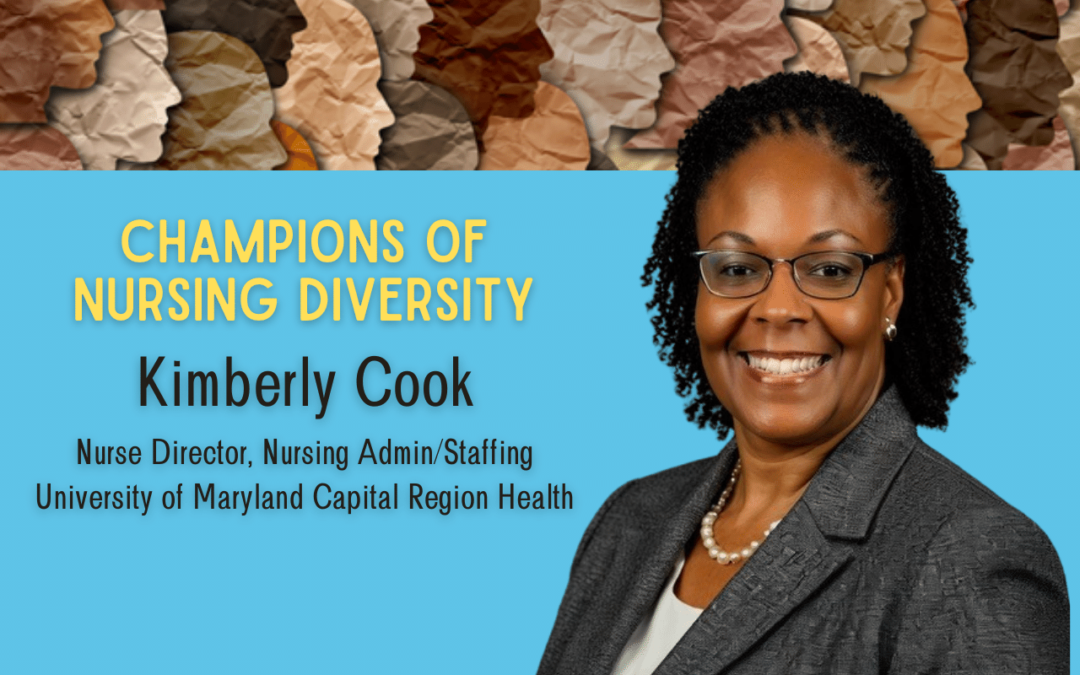Kimberly Cook, RN, BSN, is a highly accomplished nurse leader with a 30-year career in the healthcare industry. She graduated from the University of Virginia with a nursing degree and became a nurse in the Army early in her career. During wartime, Cook showed her dedication and commitment to patient care, which instilled in her a profound sense of duty, resilience, and an unwavering ability to thrive under pressure. 
Throughout her career, Cook has held various management positions where she consistently demonstrated exceptional leadership qualities. She rose through the ranks quickly, earning the respect and admiration of her colleagues, staff, and executive team. Her visionary mindset has enabled her to drive positive change and implement innovative strategies within healthcare.
Cook holds the Director of Nursing Administration Staffing position at the University of Maryland Capital Region Health, a member organization of the University of Maryland Medical System. In this role, Cook leads a team of dedicated professionals, tirelessly ensuring that the right resources and personnel are available to deliver quality patient care.
Cook is an important nursing leader, and we’re proud to profile her as part of the Champions of Nursing Diversity Series 2024. The series highlights healthcare leaders who are prominent figures in their organizations and are making transformational impacts in nursing.
Meet Kimberly Cook, RN, BSN, Nurse Director, Nursing Admin/Staffing at the University of Maryland Capital Region Health.
Talk about your role in nursing.
As the Director of Nursing Administration/Staffing, I hold a key leadership position responsible for overseeing the nursing administration and staffing functions within UM Capital Region Health. My key responsibilities include the following:
- Provide strong leadership and guidance to the nursing administration and staffing team.
- Develop and implement strategic goals, objectives, and policies related to nursing administration and staffing.
- Foster a positive and collaborative work environment that promotes teamwork, respect, and professional development.
- Develop and execute staffing plans to ensure optimal allocation of nursing staff across all departments and shifts.
- Collaborate with unit managers to monitor and maintain appropriate staffing levels based on acuity and workload demands.
- Implement effective scheduling practices to ensure adequate coverage and adherence to the Collective Bargaining Agreement and budgeted financial targets.
- Prepare and manage the nursing administration and staffing budget, ensuring efficient resource allocation.
- Manage and assess daily productivity and labor management.
- Monitor and control staffing-related expenditures, identifying cost savings without compromising patient care.
- Monitor and evaluate staff performance, providing regular feedback, coaching, and recognition.
- Collaborate with quality management teams to identify improvement areas and implement initiatives to enhance patient outcomes.
- Oversee the recruitment and selection process for staff and agency staff.
- Onboard new staff and agency staff.
- Manage all agency staff recruitment, onboarding, and billing.
How long have you worked in the nursing field?
> 32 years
Why did you become a nurse?
I attended a Catholic high school where volunteering was a requirement to graduate. I volunteered at a local hospital because it was close to my school. Prior to volunteering, the field of nursing had not crossed my mind. However, observing the fantastic work of nurses during my volunteer service triggered that “ah ha” moment, where I realized that Nursing was the profession I wanted to pursue.
What are the most important attributes of today’s nursing leaders?
There are several important attributes of today’s nursing leaders. The one that is most important for me is adaptability and resilience. The healthcare industry is continuously evolving, and nursing leaders must be adaptable to embrace change and lead their teams through transitions. They should be resilient in the face of challenges, remaining calm and composed while leading others.
What does being a nursing leader mean to you, and what are you most proud of?
Being a nurse leader involves inspiring and influencing others towards a common goal. I am most proud when I can create and sustain effective teams while fostering a positive work environment where staff feel supported and valued.
Tell us about your career path and how you ascended to that role.
My Career began as an Army nurse. After leaving active duty, I remained a federal employee working in a military hospital. My first job was as a manager of two 40-bed Med Surg Units. After several years in a managerial role, I transitioned to nursing supervisor. As a Nursing Supervisor, I had a keen sense of staffing and how it applied to budgeting and productivity. The role of the Director opened, and I was asked to step into the role based on my previous work and reputation.
What is the most significant challenge facing nursing today?
The biggest challenge in nursing today is our ability to change and adapt as healthcare changes. Since Covid, we have had to be creative with staffing to care for our patients. However, we must remember to care for our staff in the same frame.
As a nursing leader, how are you working to overcome this challenge?
By keeping the organization’s goals in sight, but always remaining humble and empathetic.
What nursing leader inspires you the most and why?
General Hazel Johnson-Brown was the first African-American woman to become a General in the United States Army and the first African-American Chief of the Army Nurse Corps. Her accomplishments and impact have had a profound effect. Her success demonstrated that black women could achieve the highest leadership positions with determination, perseverance, and skill.
What inspirational message would you like to share with the next generation of nurses?
Nursing can be challenging at times, and there may be moments when you feel discouraged. However, it’s essential to recognize that even the most challenging days present valuable personal and professional growth opportunities. Keep moving forward confidently, knowing that tomorrow will bring a fresh start.



